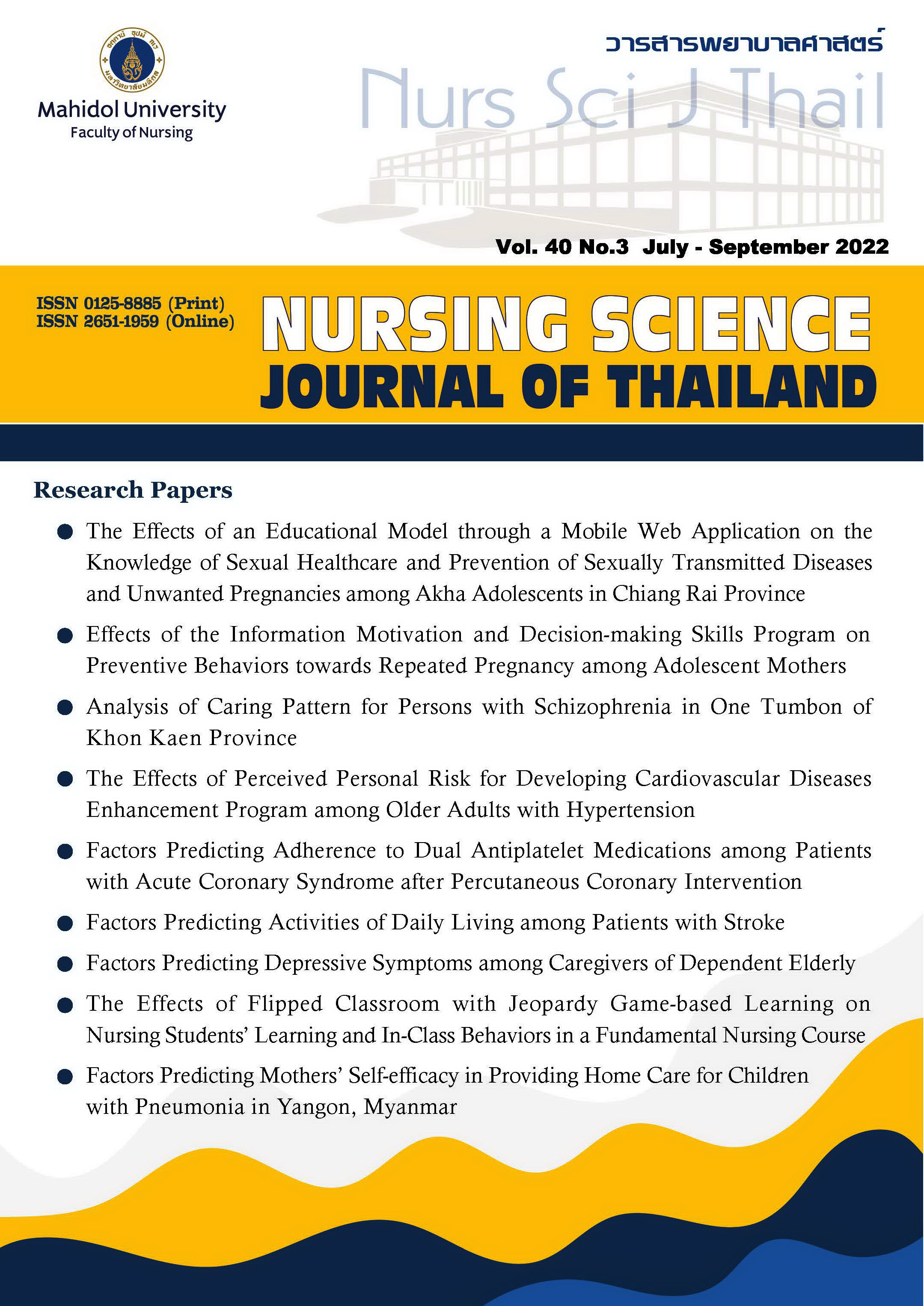The Effects of Flipped Classroom with Jeopardy Game-based Learning on Nursing Students’ Learning and In-Class Behaviors in a Fundamental Nursing Course
Main Article Content
Abstract
Purpose: To compare in-class behaviors scores, post-test scores and individual assignment scores between nursing students participating in the flipped classroom with asking questions and the flipped classroom with Jeopardy game during studying the Fundamental Nursing Course.
Design: Descriptive comparative study design via secondary data analysis.
Methods: The students in academic year 2018 were taught using the flipped classroom with asking questions and those in academic year 2019 using the flipped classroom with Jeopardy game. Systematic random sampling was conducted to obtain data of 20 students per group, a total of 40 students. Comparison of in-class behaviors scores, post-test scores and individual assignment scores between two groups were analyzed using Mann- Whitney U test.
Main findings: The in-class behaviors scores of the flipped classroom with Jeopardy game group were higher than that of the flipped classroom with asking questions group (p < .05). The post-test scores and the individual assignment scores of two groups did not differ.
Conclusion and recommendations: The teaching and learning of nursing in the flipped classroom with Jeopardy game helps students to learn through activities and social interactions resulting in better in-class behaviors. Both teaching and learning methods are encouraged to use in class rather than using merely lecture method. For further study, the retention of students' knowledge should also be assessed.
Article Details

This work is licensed under a Creative Commons Attribution-NonCommercial-NoDerivatives 4.0 International License.
Copyright Notice: Nursing Science Journal of Thailand has exclusive rights to publish and distribute the manuscript and all contents therein. Without the journal’s permission, the dissemination of the manuscript in another journal or online, and the reproduction of the manuscript for non-educational purpose are prohibited.

Disclaimer: The opinion expressed and figures provided in this journal, NSJT, are the sole responsibility of the authors. The editorial board bears no responsibility in this regard.
References
Jan M, Gaydos M. What is game-based learning? past, present, and future [Internet]. Educational Technology Publications: Englewood Cliffs, NJ; 2016 [cited 2022 Apr 1] Available from: http://www.jstor.org/stable/44430486.
Granic I, Lobel A, Engels RCME. The benefits of playing video games. Am Psychol. 2014;69(1):66-78. doi: 10.1037/a0034857.
Zehler A, Musallam E. Game-based learning and nursing students' clinical judgment in postpartum hemorrhage: a pilot study. J Nurs Educ. 2021;60(3):159-64. doi: 10.3928/01484834-20210222-07.
Johnsen HM, Fossum M, Vivekananda-Schmidt P, Fruhling A, Slettebø Å. Teaching clinical reasoning and decision-making skills to nursing students: design, development, and usability evaluation of a serious game. Int J Med Inform. 2016;94:39-48. doi: 10.1016/j.ijmedinf.2016.06.014.
Ma D, Shi Y, Zhang G, Zhang J. Does theme game-based teaching promote better learning about disaster nursing than scenario simulation: a randomized controlled trial. Nurse Educ Today. 2021;103:104923. doi: 10.1016/j.nedt.2021.104923.
Xu Y, Lau Y, Cheng LJ, Lau ST. Learning experiences of game-based educational intervention in nursing students: a systematic mixed-studies review. Nurse Educ Today. 2021;107:105139. doi: 10.1016/j.nedt.2021.105139.
Limvong T, Saengri Y. Flipped classroom: new learning for 21st century skills. Mahidol R2R e-Journal. 2019;6(2):9-17. doi: 10.14456/jmu.2019.10. (in Thai).
Hew KF, Lo CH. Flipped classroom improves student learning in health professions education: a meta-analysis. BMC Med Educ. 2018;18(1):38. doi: 10.1186/s12909-018-1144-z.
Roehling PV, Luna LR, Richie FJ, Shaughnessy JJ. The benefits, drawbacks, and challenges of using the flipped classroom in an introduction to psychology course. Teach Psychol. 2017;44(3):183-92. doi: 10.1177/0098628317711282.
Simpson V, Richards E. Flipping the classroom to teach population health: increasing the relevance. Nurse Educ Pract. 2015;15(3):162-7. doi: 10.1016/j.nepr.2014.12.001.
Jirasevijinda T, Brown LC. Jeopardy! an innovative approach to teach psychosocial aspects of pediatrics. Patient Educ Couns. 2010;80:333-6. doi:10.1016/j.pec.2010.06.002.
O'Leary S, Diepenhorst L, Churley-Strom R, Magrane D. Educational games in an obstetrics and gynecology core curriculum. Am J Obstet Gynecol. 2005;193(5):1848-51. doi: 10.1016/j.ajog.2005.07.059.
Aljezawi M, Albashtawy M. Quiz game teaching format versus didactic lectures. Br J Nurs. 2015;24(2):86-92. doi: 10.12968/bjon.2015.24.2.86.
Bayer-Hummel T. The effects of jeopardy as a test preparation strategy for nursing students. Teach Learn Nurs. 2010;5:12-5. doi: 10.1016/j.teln.2009.05.002.
Chaimay B. Sample size determination in descriptive study in public health. Thaksin University Journal. 2013;16(2):9-18. (in Thai).
Buakhieo S. How can scaffolding support learning development? Journal of Humanities and Social Sciences Review. 2016;18(1):1-15. (in Thai).
Foldnes N. The flipped classroom and cooperative learning: evidence from a randomised experiment. Act Learn High Educ. 2016;17(1):39-49. doi: 10.1177/1469787415616726.
Long T, Cummins J, Waugh M. Use of the flipped classroom instructional model in higher education: instructors' perspectives. J Comput High Educ. 2017;29:179–200. doi: 10.1007/s12528-016-9119-8.
Spector BS, Leard C. Community engagement model for course and program development. Paper presented at: Global Conference on Education and Research; 2017 May 22-25; Sarasota, FL, USA.
Nouri J. The flipped classroom: for active, effective and increased learning - especially for low achievers. Int J Educ Technol High Educ. 2016;13(33):1-10. doi: 10.1186/s41239-016-0032-z.
Jo J, Jun H, Lim H. A comparative study on gamification of the flipped classroom in engineering education to enhance the effects of learning. Comput Appl Eng Educ. 2018;26(5):1626-40. doi: 10.1002/cae.21992.
Stelzer L, Coll-Reilly J. Collaborative team testing to support individual learning: can teamwork motivate learning? Contemp Issues Educ Res (Littleton). 2010;3(12):7-16. doi: 10.19030/cier.v3i12.918.
Khorsuk C, Harnklar S, Chaiwan W. The effect of cooperative learning by using teams-games-tournament method on achievement in maternal and newborn nursing comprehension subject of 4th grade nurse students. Paper presented at: Academic and Annual Conferences 2019; 2019 September 5-6; Sima Thani Hotel, Nakhon Ratchasima, Thailand. (in Thai).
Devi K. Comparison of quiz vs lecture method in teaching community medicine to under graduate medical students. Natl J Res Community Med. 2017;6(3):200-5.
Warburton N, Volet S. Enhancing self-directed learning through a content quiz group learning assignment. Active Learn High Educ. 2013;14(1):9-22. doi:10.1177/1469787412467126.
Murad SS. Brain involvement in the use of games in nursing education. J Nurs Educ Pract. 2017;7(6):90-4. doi: 10.5430/jnep.v7n6p90.


